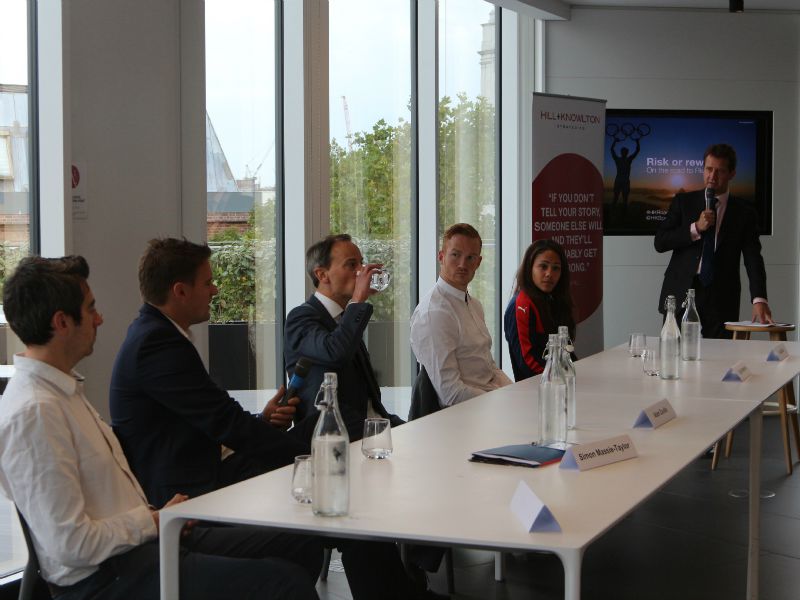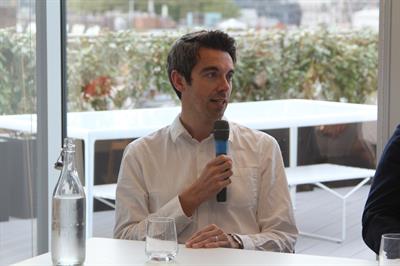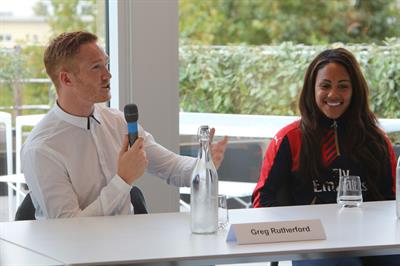Hill+Knowlton Strategies 17 Aug 2015 // 1:29PM GMT

To mark one year to go until the Rio 2016 Olympic Games, H+K Sports hosted a memorable Q&A event addressing the major issues affecting sport today.
Broadcaster Mark Pougatch moderated a lively debate from a panel across the world of sport. London 2012 Olympic gold medallist Greg Rutherford, England Women’s football player Alex Scott, British Olympic Association Commercial Director Simon Massie-Taylor, Marketing Director at Aldi Adam Zavalis and Sports Editor at Guardian Online James Dart addressed the key issues dominating the global sport agenda.
Here are our top 10 watch outs from a lively debate:
1. Olympic legacy continues to divide opinion across the sporting landscape
Since the end of London 2012, the stated aim of the games to ‘inspire a generation’ has come under huge scrutiny. There was much discussion about how successful the legacy has been. While there have been conflicting reports on the direct effect of the games on participation, this is clearly a topic at front of mind for the upcoming Olympic Games. Adam Zavalis, Marketing Director at Aldi spoke about the opportunity Olympic legacy offers – ‘There's an opportunity for brands to play a positive part’.
2. Performance enhancing drugs continue to dominate
The revelations in the Sunday Times about doping in sport were a key topic of conversation. Greg Rutherford was keen to stress that the majority of athletes are clean. He felt that it was the responsibility of the clean athletes to prove it is possible to win without using performance enhancing drugs. Rutherford spoke strongly on the IAAF, claiming that there was certainly something wrong in the way drug abuse has been dealt with, and that widespread changes are needed at the organisation. Rutherford stressed that athletics is in risk of becoming ‘another road cycling’ in the way drug use is now seen.
3. We all have a responsibility to grow women’s sport
On the back of the great success of the England Lionesses at the FIFA Women’s World Cup, women’s sport is a huge talking point. Alex Scott, one of the stars of the women’s team, spoke of the fantastic growth in interest she has experienced since the end of the tournament. An extremely interesting take came from James Dart. He stressed that while coverage of women’s sport is growing (The Guardian’s coverage of the WWC final was one of their most visited football stories all year) the media is still failing women’s sport to an extent. He made it clear the media has a role in supporting development of sport for women.

4. Real change is needed to secure the future of sport
One of the topics that caused the most heated discussion was securing the future of sport. Greg Rutherford in particular spoke with great emotion about the topic. He has gone on record in the past saying he wouldn’t want his son to compete in professional athletics. Rutherford again stressed his point of view, commenting that the lack of support and level of politics in athletics means it isn’t a path he would encourage. Rutherford also said that based on current trends ‘the sport in its current form will likely not exist by the time he is ready to compete’.
5. The pressure of achievement can affect Rights Holders, Sponsors and Athletes alike
Another topic discussed was the practice of setting overly ambitious targets for medals at the Olympic Games. This topic certainly caused debate, with the athletes generally believing it was good to set goals. In the room, there was a belief that it was an unhelpful practice, on the basis that it could lead to accusations of failure, post games. Simon Massie-Taylor of the BOA was keen to stress that it was far too early for the BOA to be setting medal targets. It was a big day for Massie-Taylor, as it was the day the BOA launched their ‘Bring on the great’ campaign for Rio 2016 - https://www.youtube.com/watch?v=dL3uk7Jsep8
6. Sport in schools needs to be about more than taking part
Sport in schools and the way to encourage young people in sport was another talking point discussed. It was widely agreed that the process of rewarding participation in school sport, and discouraging competition will not deliver world class athletes. As Greg Rutherford said - ‘The infrastructure, in my opinion, has failed’. Alex Scott recalled how she got into football, trying to keep up with her older brother. As Pougatch was keen to point out, now he can’t keep up with her!

7. Choosing a sponsorship is all about values
Some of the key insight on sponsorship came from Adam Zavalis, Marketing Director at Aldi. While some may question why a ‘German discounter’ is sponsoring Team GB, Zavalis stressed it was all about values and having an authentic narrative. Aldi have been in the UK for 25 years, so have a real legacy as a British brand. For Zavalis, it was the values of the BOA that were most appealing. Having considered several sports, Team GB offered a set of values and positioning that Aldi felt comfortable with. A good example of why thinking carefully about what to sponsor is so important.
8. Digital publishing in Rio will be a whole new ball game
In today’s digital age, the way sport is consumed has completely changed. James Dart gave an expert view on the world of digital publishing. He spoke about how the offer had grown; from just him on the digital team for the Sydney Olympics, to a huge London 2012 offer to an even greater offering for Rio. Dart made it clear that it is mobile content that will drive the strategy for Rio.
9. Athletes on social media, a shadow of themselves?
Personal brands are key and social is where brands can build them however both Rutherford and Scott spoke about occasions where they have been criticised for voicing an opinion on social media. They both saw it as an important opportunity to build their profile, but were clear that because of the backlash you receive, it will never be their true selves that come across on social media.
10. The funding model in UK sport still has its critics
The Sport England elite funding model, often criticised in the past again came up for discussion. The case for funding was made for sports like Basketball, who have had their funding cut because of a lack of medal success. It’s clear though from the reaction in the room, that this policy remains a controversial funding model.
By James Fenn, Account Executive at Hill+Knowlton Strategies


































.jpg)


.png)
.jpg)











